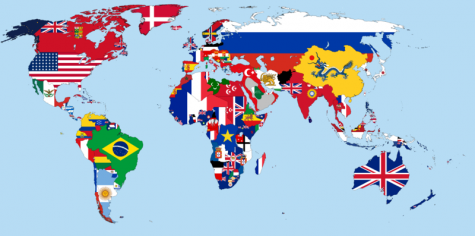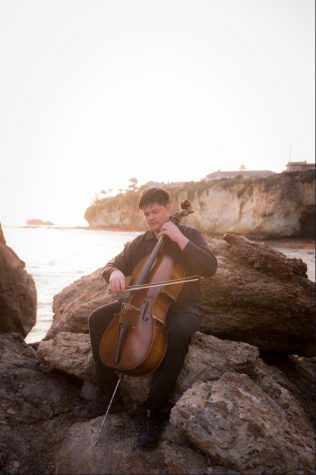Foreign View of America; What do we look like to other countries?

On the world stage, the United States can be a controversial topic between countries. Some view the U.S. as a cesspit of nationalism and narcissism, others view it as the country of freedom and opportunity that it projects itself as. Having interviewed people from Germany, Mexico, and the Philippines, I noted some of these differences in opinion in the context of the different countries cultures, as well as the opinions of individuals from those countries. Another part of the research conducted was knowledge about American Culture from the Internet and TV. From here on, there is the testimony of individuals who do not represent the whole of their countries but have opinions based on cultural differences.

The first interview was with Helene Walk, a 12th-year student from Western Germany, about the amount of America-Centric media she sees online.
“I think I hear quite a lot, you can see the American culture or the American experience in movies and TV shows, but it’s also explained very well in books. I see a lot of news about the … politics, events that are happening.”
Walk continued to talk more in-depth about how much American News appears on German media, and provided this information on her opinion.
“I think the U.S is a very interesting country, but since it’s also a big topic in school or in general, there are also some things that could be criticized.”
With that, the idea of Germany’s view as a whole became a question, as well as how the German culture affected her opinion
“I think that the picture that every German has from America is the classical thing like Thanksgiving or the suburbs, maybe like a combination of money and wealth.”
“I would definitely say that our market economy, that being the social market economy, affects my opinion, instead of the free market economy which the United States [has], it’s pretty obvious that a lot of Germans think that the free market economy isn’t very good because we have the comparison of being helped by the state.”
With Walk’s earlier statement about the amount of American media in Germany, the question was raised about how American culture has affected German culture.
“It definitely affects the younger generations through social media, YouTube videos, and just celebrities, so I don’t think that the older generations don’t get that much influence.”
Throughout this discussion, it became more apparent that much of what people see online, especially in the States, is very American-centric, and whenever something from another country is passed around online, it’s always a scandal or a tragedy, rarely basic politics. While this is not necessarily true for country-specific news sites, websites and apps such as Instagram, Reddit, or Twitter have many more American users and feeds than foreign users.

A similar interview was conducted with Sofía Lagunas of Mexico. She noted that Mexico’s national news outlets may show less American News, but the internet shows a lot more.
“I use more online news. I follow CNN… or big news on Instagram or [it appears] on my phone.”
She noted that she has traveled to the country on a few separate occasions, to states such as Washington, Georgia, Florida, and New York. When asked, it seemed that her opinion of the states mirrored what she saw.
“For me, I see the US as a land that has many opportunities and that has many advantages over many countries, but I think that they are not using what they can. Like they have many more things than Mexico and for what I see pretty much pretty big potential in the U.S. but I think not many citizens are really living up to that.”
Her personal opinion was pretty standard according to her account of others’ opinions of the U.S.
“Well many Mexicans see the U.S. as a better country than Mexico with many hiring jobs. Perhaps those are views of older people but for younger people, we see [that it] is not wonderful as they say. Some of us say it’s pretty big, pretty amazing, I want to live there, others say no what’s happening in the news is terrifying, I don’t want to live there.”
Lagunas also stated that she thought that in some cases, the Mexican and American cultures are pretty similar.
“Here we have many cultures, the Aztecs, Mayans, Olmecs, many more, many languages, and in the US there also are, let’s say, cousin cultures because I read that some of the languages spoken here are cousins to some of the Native American Languages there in the United States. The U.S. is a bit more whitewashed, but the cultures are very similar.”
She noted that there are obvious differences in food and language, but historically, Mexico and the States have many similarities that make them somewhat alike. Furthermore, the official language of Mexico, Spanish, when compared to English has similar words and phrases. While Spanish is the primary language, Lagunas stated that most schools in Mexico teach English and she had been taught English since kindergarten.
When some reflect on the traditions, staples, and customs of Mexico and the U.S. it can seem a bit unusual to them, but for others who pay attention and educate themselves about the cultures of both countries, it seems apparent. Lagunas stated that American movies and music are very popular in Mexico, specifically citing Disney movies such as Frozen.

The last interview conducted was with Aman Arceo of the Philippines. He’s visited the United States multiple times, to places such as New York, California, and Nevada.
Near the start of the interview, Arceo noted that most of the news at the international stage is based on the coast, specifically Washington D.C., Florida, Texas, and California.
“I think what a lot of people don’t see, and especially what I saw, was what happens in the hundreds of miles between the coasts. A lot of the different things, or what basically the heart of the US is is those hundreds of miles, and it really isn’t that flashy in comparison to the coasts.”
Before visiting, Arceo’s perception of the U.S. was that it was a larger version of Hollywood, super modernized and that everyone thought that it was the greatest country in the world.
“Once you get there, and also once you travel to different countries, that perception kind of changes.”
When asked about the availability of U.S. news, he stated that different channels, such as CNBC and CNN are available, and the local news networks broadcast American news as well, though it’s mostly limited to major events.
“Social Media plays a major role if you follow any of those accounts.”
Arceo stated that his overall opinion of the country changed over time, starting with the idea that the U.S. was the greatest country in the world.
“I don’t know, I really think it’s a good country with a lot of opportunities and it’s really a country where people come to make their dreams come true.”
He brought the economic disparity between the U.S and the Philippines, noting that 2000 USD is enough to live comfortably, but that in the US, 2000 USD is barely enough to pay rent depending on the state.
“The general idea of how my country views the U.S. is that it is the land of opportunity, it’s that they’re able to have the opportunity to build themselves, really build a career in the U.S. One thing that the Philippines lack is the job opportunities. If you become a nurse here, there’s going to be twenty other people in the line, and you also have to get in that line to get that job. One thing that the U.S always needs is nurses, and that’s why a lot of the nurses, and it’s typically nurses go to the U.S., and try to build a career, get their job, get their money, and to send it back to their families.”
Arceo noted that it was very common for Filipinos to send their children to the U.S. as a retirement plan for the money to be sent back.
“Filipinos have kids, make them study, become a nurse, send them to the U.S, make them work their asses off, and then have them send the money back to the family in the Philippines. Even 1000 USD is enough to have a house, have a car, and to live a pretty comfortable lifestyle.”
His take on the U.S. gives way to the typical American viewpoint of the U.S., that being the land of opportunity and wealth, as opposed to the German and Mexican takes, wherein Laguna’s case, it seemed that Mexico viewed the U.S. as an equal if a slightly better country. While Walk’s German perspective tends to look at the U.S as a less economically successful country in terms of policies.
Overall, it seems that different parts of the world view the U.S. differently based on cultural and historical differences. An observation made is that different countries’ perspectives can be based on economic differences as well. Germany has a stronger economy, and therefore sees the U.S as less powerful, while the Philippines has a much weaker economy, and therefore views the U.S as a land of opportunity.
Some people see the U.S. as a land of opportunity where not only you can provide for yourself but for your loved ones, while others view it as a place lacking cultural awareness with great economic downfalls. The U.S. isn’t just one or the other: it’s a mix of the many viewpoints, and even though it can be messy and confusing, Americans continue to move forward and evolve in hopes of meeting all the standards of being the great country many perceive it to be.

Matthew VanderKelen is a senior and a first-year reporter with the Eagle Times. Matthew is a cellist with the San Luis Obispo Youth Symphony, and enjoys...





